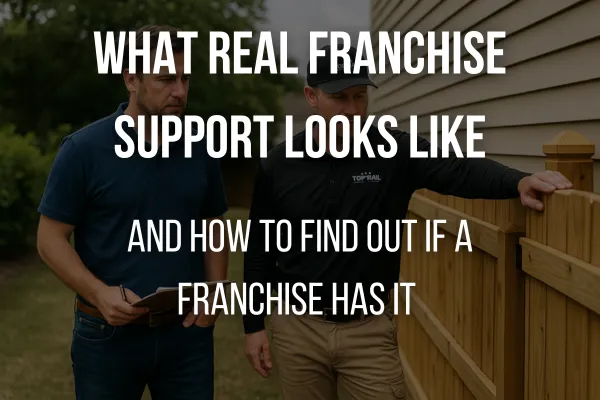
Every Franchise Says They Have Great Support- How to Tell If That's True
What Real Franchise Support Actually Looks Like
Support is one of the most overused — and misunderstood — words in franchising.
Every brand claims to offer it. Every website lists it as a selling point. But once you sign the agreement and step into the operator’s seat, you realize fast: most “support” just means you can email someone if things go wrong.
And that’s not enough.
What makes things even trickier is that all franchises — even ones with only a handful of owners — try to position themselves on the same level as McDonald’s. Some even sound better on paper. But most aren’t even in the same universe operationally.
That doesn’t mean they’re all bad. In fact, some younger franchises offer better support than their larger competitors because they’re hungry, lean, and closer to their owners. Some are part of a large platform and they had most of the support built before adding a new brand to their portfolio.
The key is knowing how to tell the difference.
This is one of the biggest reasons you’re buying a franchise — the promise of proven systems and experienced guidance. So you better know exactly what kind of support you’re really getting.
Here’s what to look for.
1. Functional Coaching vs. Generalist Support
Strong franchises provide coaching across specific functions — not vague “franchisee success” roles.
The two most important areas are marketing and operations. These need dedicated people with clear job descriptions and relevant backgrounds. If someone is juggling both — or also managing corporate locations — they aren’t focused on your business.
Here’s what to dig into:
How many coaches or support staff are there?
Divide that by the number of franchisees. If it’s 1 coach for every 30+ owners, support is stretched thin.What’s their full-time role?
Do they only coach franchisees, or are they also running company stores or helping with sales?Have they done this before?
You want someone who’s actually built or run a successful location or a business in the same industry.
One coach who knows their stuff and meets weekly is better than five people with job titles and no impact. However, having dedicated marketing coaches and dedicated operational coaches is the best way I have seen franchises support their franchisees.
2. Multi-Phase Training — Not One-and-Done
Training needs to be layered. Not a single 3-day boot camp. Not a checklist of “modules” with no follow-up.
The best franchises give you:
Online learning to reference later — and to reuse when training your first hires
In-person training that simulates real-life operations and client interactions
Structured follow-up: 30-, 60-, 90-day coaching calls to keep you moving and accountable
And there’s a gold standard: they visit your location once you’ve launched — or they bring you back for a second round of training after you’ve been in the field.
This second-touch approach is rare, but incredibly valuable. The first time through training, you don’t know what you don’t know. The second time, you’ve got context. That’s when the real learning happens.
3. Tools ≠ Support
Having tech is not the same as having support.
Every franchisor has a dashboard now. CRM, quoting tools, analytics… but if they don’t teach you how to use it, if they don’t hold you accountable to the numbers, it’s just useless fees.
Good systems:
Train you on the tools during onboarding and revisit them after launch
Track usage — not just “do you have it?” but “are you using it to drive results?”
Make the tools part of the coaching conversation, not an afterthought
A tool without training is just a feature. A tool integrated into your weekly rhythm is real support.
4. Validation: Owners Should Find Value in Their Meetings
If the support system is good, franchisees won’t rave about it (they usually don't realize there are bad ones out there) but they will tell you they don't miss meetings. Actions speak louder than words here.
Ask about their calls with coaches. Strong signs:
They say things like “yeah, we meet weekly” or “I talk to Haley every Thursday” — without fanfare
They consistently show up for scheduled meetings — because those meetings drive real decisions
They use coaches as sounding boards for real business challenges, not just check-in calls
Be cautious of emotional spikes.
If a franchisee sounds bitter or frustrated, it usually means they were promised support but didn’t get it. If they gush too hard, it may be one of the only things that’s working — which raises other questions.
What you want is steady, thoughtful confirmation that the support system is structured, consistent, and part of their routine.
Conclusion
Building and maintaining a real support team is expensive. It takes people, process, and focus. Not every franchise does it well — even the big ones.
But it’s not hard to verify once you know what to look for.
Figure out the kind of support you want.
Then validate — directly, and in detail with multiple franchisees— whether it’s actually happening inside the system. Don’t take the franchisor’s word for it. Don’t get dazzled by job titles or dashboards.
If the support isn’t structured, scheduled, and proactive — with dedicated people doing one job well — then it’s not support.
It’s just marketing.
